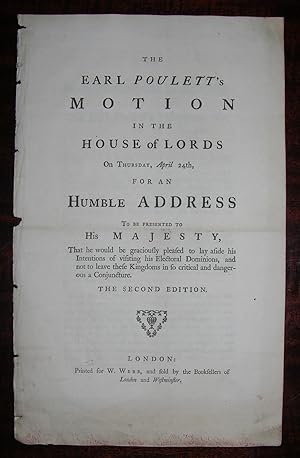Descripción
POULETT, John, Earl (1708-1764).The Earl Poulett's Motion in the House of Lords on Thursday, April 24th, for an Humble Address To be presented to His Majesty, That he would be graciously pleased to lay aside his Intentions of visiting his Electoral Dominions, and not to leave these Kingdoms in so critical and dangerous a Conjecture. London: Printed for W. Webb, and sold by the Booksellers of London and Westminster, [1755]. Folio (12 4/8 x 7 6/8 inches). 6-pages. Woodcut publisher's device on title-page, woodcut head-piece and 3-line initial on the first page of text (disbound, old folds, edges a bit browned). Second edition. In the summer of 1754 news came from America that Colonel Washington had been obliged to surrender in America, reinforcements were dispatched and Britain moved one step nearer to a major war. George II was understandably concerned for his Hanoverian realm, should any war spread to Europe, and so planned a visit to Hanover in April of 1755. Poulett addressed the House of Lords, in order to avert what he considered to be a hazardous adventure, at some a critical time. "In April 1755 the king left for his last visit to Hanover, accompanied by Lady Yarmouth and Lord Holdernesse. In view of the possible need for speedy military decisions, Cumberland was put at the head of the lords justices. On 8 June two French men-of-war were seized off the coast of Canada, but the following month General Braddock, leading the reinforcements, was defeated and killed outside Fort Duquesne. The king was, as usual, greatly concerned for the security of Hanover and responded by negotiating a number of subsidy treaties for its protection should the colonial skirmishing spread to Europe. These revived many of the issues of the previous war. The first of Newcastle's shaky team to wobble was Henry Legge, his chancellor of the exchequer, who pointedly refused to authorize payment of the Hesse subsidy. This persuaded Newcastle to reopen discussions with Pitt. They did not get far, since not only was Pitt hostile to the treaties but he had staked out a new line by coming to an understanding with Leicester House, where young Prince George and his tutor the earl of Bute had decided to set up as a political interest. George consequently returned from Hanover in September 1755 to find yet another political crisis, with the government looking in bad shape for the new parliamentary session and an unpredictable reversionary interest emerging" (John Cannon for DNB). Poulett, inherited his father's earldom in 1743, was appointed Lord Lieutenant of Somerset in 1744, was colonel of the 1st Somerset Regiment of Militia from 1759 and was sometime Recorder of Bridgwater. ESTC T32371. Catalogued by Kate Hunter. N° de ref. del artículo 72lib1282
Contactar al vendedor
Denunciar este artículo
![]()
